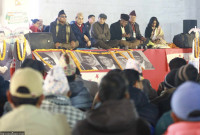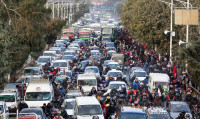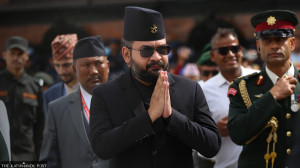Opinion
Suis-je Charlie?
In the aftermath of Charlie Hebdo, all religions with fanatical followers must look within
Sophia K Tamot
At home and abroad
Last weekend’s Paris attacks, aimed at the French satirical magazine Charlie Hebdo for publishing cartoons considered offensive by Muslims, which left 17 people massacred, reminded me of a tragedy that struck closer to home 10 years ago.
Nepal experienced its own siege of sorts in September 2004, when news of 12 Nepalis beheaded by supporters of al-Qaeda in Iraq sparked an ethnic attack that targeted Muslim businesses, shopkeepers, mosques, and individuals in several cities for days. It was shocking to see how quickly anger can breed blind hatred and such opportunities are exactly what groups that thrive on exploiting blind spots seek in order to spread fear amongst civilians and capitalise on the ensuing terror.
France has not reported a spark in such incidents, which is a good thing, but there are scattered news of a few targeted attacks on mosques and Muslim individuals in the media every now and then. However, in the aftermath of the attack, one thing was clear—every person in France was a victim, Muslims and non-Muslims alike.
The attack not only drew global criticism towards the Muslim world’s intolerance of the European way of free speech and humour, but it also raised debates about free speech and its limits. While many media houses in Europe retaliated by republishing Charlie Hebdo’s cartoons, the circulation of the magazine trebled. Je suis Charlie hashtags dominated the entire country, European capitals, and social media; the American and British press chose to take a more restrained approach by denouncing the massacre but not reprinting the cartoons. Another hashtag was seen doing the rounds, Je ne suis pas Charlie—I am not Charlie—as the tragedy unfolded a rising debate about the right to offend and its limits. When news emerged that one of the casualties was a Muslim policeman of North African descent, Je suis Ahmed hashtags posted by Muslim supporters surfaced, with the number of reposts gradually climbing.
The French have always taken immense pride in their civil liberties and more specifically their right to expression—as evident in their press, politics, streets, and satire, the latter of which is generally generously laced with sexual and political connotation, ridicule of religious symbols, and can often be politically incorrect. But last week’s attack could not have come at a worse time. France’s troubled economy has been plagued by rising inequality, worsening unemployment rates, and growing exclusion of migrant minorities. Political and social tension is increasing and the world will watch with interest how the people of France will respond to the far right’s voice to tighten immigration policies as they become louder and stronger.
Repeating patterns
Truth is, the so-called jihadists in the Paris attack conveniently used religion as an excuse, as is the case with most terrorism related incidents throughout the world. Of course, Muslims find lewd cartoons of the Prophet offensive and so will communities of other faiths, when they find their gods and goddesses on bikinis and on footwear. Which is why we hear of beheadings, fatwas, riots, and killings in countries where the freedom of expression comes with certain conditions. But more importantly, in many parts of the world, the stark reality is that human life has become ostensibly too cheap.
Why is it that simply too often, it is minority communities scattered across the globe that end up the biggest losers in the aftermath of such attacks? Not only do they find their faith and motives questioned, but also each individual visibly experiences change in the way they are perceived and in the way they are treated, especially at airports, immigration, and high-profile events.
These days, no matter what city—whether the target is Islamabad, London, Paris, or Kathmandu—or whether the perpetrator is a brand new recruit from ISIS, a part-time religious fundamentalist, a psychopath, or even a delusional crown prince—the cause may be different, but the victims and pattern are nearly always the same. Scores of civilians perish, the world laments the horrible crime and questions why, the offender usually ends up dead, killed over some crossfire, but it is those left behind—those closest to the culprits as well as those closest to the victims—who have to live with the consequences: families and friends, those who have ties together, either by blood, belief, or faith.
Religion and reform
The five-fold increase in terror attacks by Islamic fundamentalists since 9/11 is an insult to Islam and its followers, and it is high time Muslim leaders across the world, and especially in South Asia, took heed of the Egyptian President’s recent call for religious reform within Islam.
Educating Muslims, converts, and the youth on the true interpretation of the Koran and moving away from the narrow stereotypes preached by puritan ideals is paramount today, as mounting acts of terrorism are increasingly associated with the religion, which is grossly misunderstood as being intolerant towards other faiths.
The same is relevant to all religions with fanatic followers. At home, there are reports of escalating conversions to Christianity, increasing numbers of madrasas operating under unclear sources of funding, and rising voices to officially associate the country with Hinduism.
Hopefully, we are now closer towards finalising our constitution and as our country moves progressively to accommodate all faiths, leaders, including those who influence them and us, need to be extremely vigilant. While religion provides solace, it can have a dark side too.




 17.12°C Kathmandu
17.12°C Kathmandu










